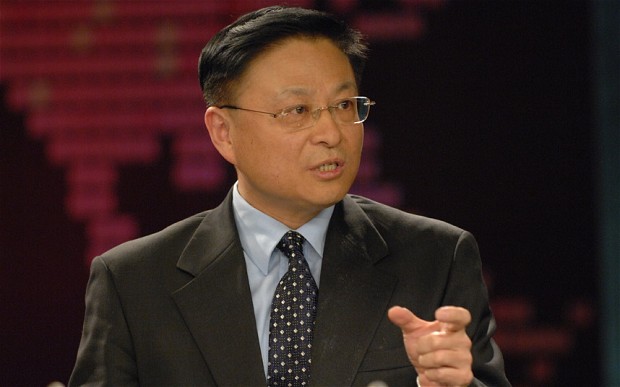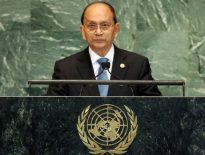War between China and Japan looms, with neither power willing to back down over a disputed chain of islands, expert warns. The spat over the Diaoyu or Senkaku islands has escalated dramatically in the past month with violent protests across China. But with a national election approaching in Japan, and a change of leadership in China, politicians on both sides have refused to step back from the brink, afraid that they will appear weak.

“There is a danger of China and Japan having a military conflict,” said Yan Xuetong, one of China’s most influential foreign policy strategists, and a noted hawk. “One country must make a concession. But I do not see Japan making concessions. I do not see either side making concessions. Both sides want to solve the situation peacefully, but neither side can provide the right approach,” he added.
He warned that unless one side backs down, there could be a repeat of the Falklands Conflict in Asia.
“Generally speaking, according to the theory of international relations, unless one country makes concessions to the other, the escalation of a conflict between two countries will not stop until there is a military clash, like between the UK and Argentina,” he said.
He added: “China takes a very tolerant policy elsewhere, with smaller powers. But the case of Japan is different. There is history between us. Japan is a big power. It regards itself as a regional, and sometimes a world power. So China can very naturally regard Japan as an equal. And if we are equal, you cannot poke us. You cannot make a mistake.”
Mr Yan is the dean of International Relations at Tsinghua university, the elite college that schooled both China’s president, Hu Jintao, and his likely successor, Xi Jinping.
He is also one of China’s representatives to the Council of Security Cooperation of Asia-Pacific, a non-governmental body that coordinates security in the region.
Chinese and Japanese diplomats have met this week for talks over the crisis, but no agreement has been reached.
Yesterday, a spokesman for the Chinese Foreign ministry attacked Yoshihiko Noda, the Japanese prime minister, for telling reporters at the United Nations that the islands belonged to Japan.
“There are no territorial issues as such. Therefore, there cannot be any compromise that represents a retreat from this position,” Mr Noda said.
“China is strongly disappointed and sternly opposes the Japanese leader’s obstinacy regarding his wrong position on the Diaoyu Islands issue,” replied the Chinese Foreign ministry.
In the balance is some £216 billion of bilateral trade. Last year, exports to China were responsible for three per cent of the Japanese economy.
Meanwhile Japan’s new opposition leader, Shinzo Abe, is, if anything, more determined than Mr Noda. “Japan’s oceans and territory are being threatened. It is my mission to overcome these difficulties,” he said.
Several Japanese businesses on the Chinese mainland have had to shut down because of the crisis. Nissan, which relies on the Chinese market for as much as 25 per cent of its revenues, has shut down until October 7 after demand for its cars plummeted.
Toyota has suspended plants in Tianjin and Guangzhou until October 8.
Chinese consumers are shying away from Japanese cars not just because of nationalism, but out of fear after one man in Xi’an was beaten into a coma for driving a Japanese marque.
All Nippon Airways, meanwhile, said 40,000 reservations had been cancelled on flights between China and Japan from this month to November. A cruise line between Shanghai and Nagasaki will suspend its operations from October 13. Guizhou television has banned all advertisements by Japanese brands.
Mitsumi, a supplier for Nintendo, has not reopened its factory in Qingdao since September 16, while two toothbrush factories owned by Lion Corporation also remain shuttered.
Mr Yan predicted that if there was a military confrontation between China and Japan, the United States would not physically intervene.
“I do not think they will send soldiers to fight against the People’s Liberation Army,” he said. “They [the US] will be involved, but they can be involved in many different ways, providing intelligence, ammunition, political support, logistical help and so on.”
Mr Yan said he expected whoever wins the US presidential election to continue to toughen policy on China.
“In terms of the economy, China and the US are partners. But in terms of security, they are rivals. We both know we cannot get along. Both sides are always alert to the other’s military policy,” he said.
“In the future, the military relationship will become more important. There is a simple reason for this: American hegemony is based on military capability and the military gap with China. When China narrows that gap, it will scare the US,” he said.
However, he added that China increasingly needs to change the ideology that guides its foreign policy. “Deng Xiaoping said China should not take a leadership role, make no alliances, and focus on the economy.
“This gap, between China’s international status and its foreign policy is widening. We have reached the point where China needs to seriously consider having a new policy consistent with its international status. I do not know when it will happen, but it will not be too long,” he said.



